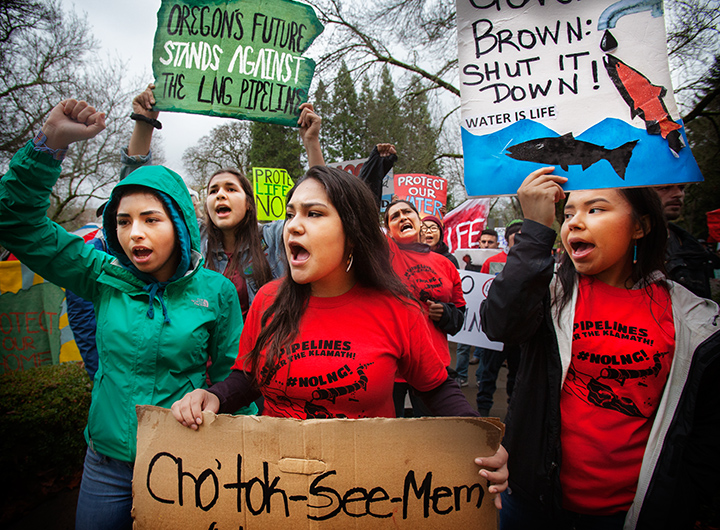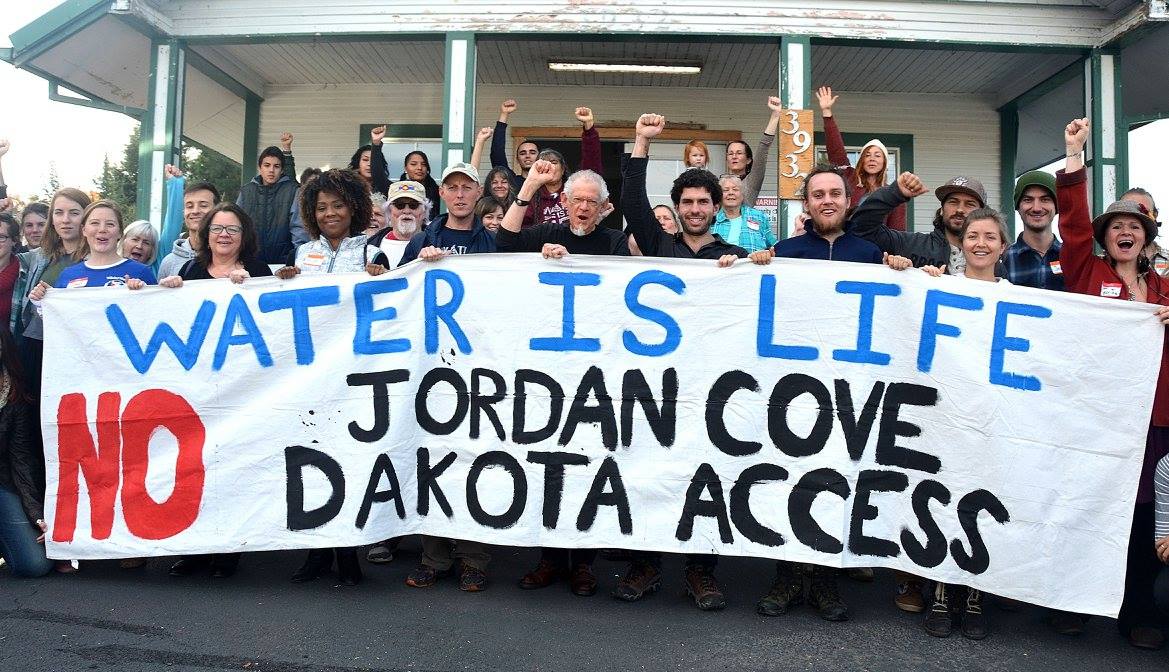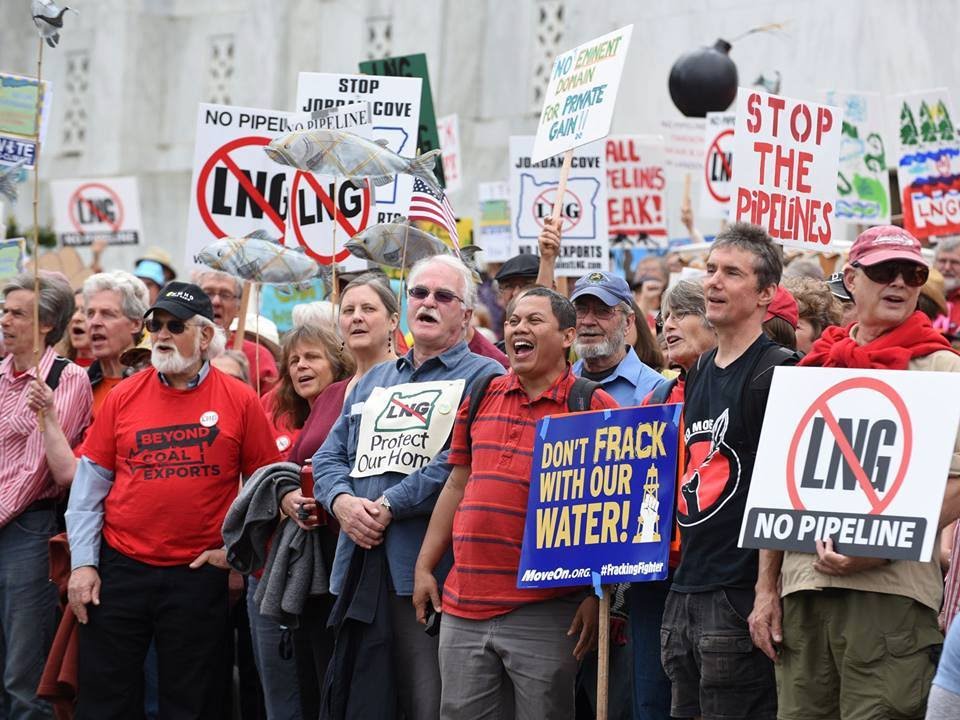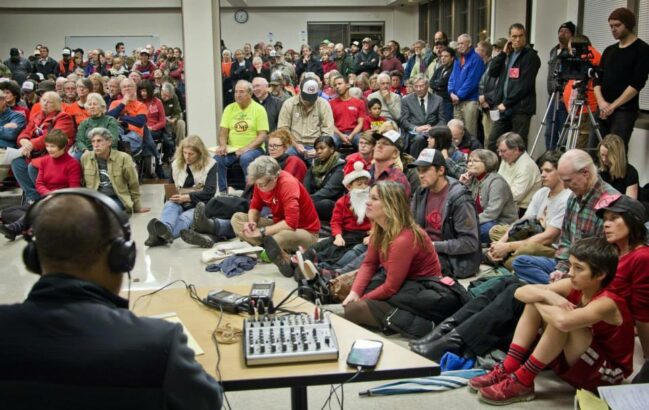Update (12/1/21): Citing its inability to secure necessary permits, Pembina announced on Dec. 2, 2021 in a letter to the Federal Energy Regulatory Commission that it would cancel the proposed Jordan Cove LNG export terminal project and associated Pacific Connector Gas Pipeline.
This 16-year campaign against a proposed fracked gas pipeline (Pacific Connector) and LNG export terminal (Jordan Cove) is not over, but the opponents are in a far better position than the proponent, Canada-based Pembina Energy. The proposal is for a 229-mile pipeline affecting traditional Klamath territories and culturally significant areas, some 600 landowners, and crossing 485 rivers, streams and wetlands on its way to Coos Bay in Southern Oregon where an LNG export terminal would be built. Lands that would be impacted by the Pacific Connector Pipeline include national forests and land under the jurisdiction of the Bureau of Land Management. The clearcut swath would take out many old-growth trees and eliminate or fragment wildlife habitat. The pipeline would also cut across the Pacific Crest Trail, the popular National Scenic Hiking Trail that runs from Mexico to Canada [source].
Two major state permits have been denied, including Clean Water Act Section 401 water quality permits. While FERC approved the project and granted eminent domain power in March 2020, it declined to override the state permit denial, as had been requested by Pembina, at their Jan 2021 meeting. In addition, in February 2020 the U.S. Dept. of Commerce rejected Pembina’s request to override the denial of the state’s denial of Coastal Zone Management Act permit.
Pembina is still seeking to obtain and in some cases renew land use permits. In addition, the state has sent mixed messages. The governor oversees the agencies that have denied permits, but has not outright opposed the project. Alarmingly, the Port of Coos Bay, which is run by commissioners appointed by the governor, was pursuing a dredging project that would have allowed the large tankers needed for Jordan Cove and is not needed for any other known purpose. But in May 2021, the Oregon Land Use Board of Appeals reversed two local dredging permits for the fledgling Jordan Cove LNG project, citing impacts to the Coos Bay Estuary.
On May 11, 2021, Pembina filed a letter with FERC seeking to “pause” the Jordan Cove project, citing a list of state permit denials that prevent the project from moving forward, despite a federal approval from the agency. “Applicants have decided to pause the development of the Project while they assess the impact of these decisions.” The letter also requested that the U.S. regulatory agency withdraw its consultation requests with the U.S. Fish and Wildlife Service and National Marine Fisheries Service on Jordan Cove’s behalf “to conserve the resources of the Commission and other operating agencies.”
Despite that fact that the project is very unlikely to move forward, the company retains eminent domain rights and landowners continue to have legal challenges regarding easements.
Recent Media Coverage
- (Dec. 1, 2021): Herald and News: Final nail in the coffin for Jordan Cove pipeline project
- (May 12, 2021): Herald and News: Jordan Cove pipeline project on pause
- (April 23, 2021): E&E News: Jordan Cove LNG terminal on ice after permit denials
- (Nov. 24, 2020): DeSmog: When Can Pipelines Take Private Land? Jordan Cove LNG Project a Test for Eminent Domain
- (Oct. 1, 2020): Pro Publica: It’s His Land. Now a Canadian Company Gets to Take It.
- (June 1, 2020): Columbia Insight: Landowners take FERC to court in hopes of blocking LNG pipeline
- (February 2020): Flux Magazine: The Pipeline Problem
- (September 22, 2019): The Oregonian: Why I refuse to hang my paintings in Gov. Brown’s office
- (March 18, 2018): The New York Times: The Next Standing Rock? A Pipeline Battle Looms in Oregon
Project Details
- Operator: Pembina Corporation, operating as Pacific Connector Gas Pipeline
- Proposed pipeline capacity: 1200 million cubic feet per day
- Length: 232 miles
- Proposed LNG terminal export capacity: Up to 7.8 million mtpa (million tons per year)
- Status: Proposed
- Start Year: 2024
- Cost estimate: $10 billion
- Bank lenders: Unknown; Texas law firm Baker Botts and Australian investment bank Macquarie are advisers on the project [source: Global Energy Monitor]
Project Status
Eminent Domain:
- A group of affected landowners who oppose the pipeline and are refusing to sell easements to Pembina Corp. was formed, the Pacific Connector Easement Action Team, under the nonprofit Greater Good Oregon, with Bold Education Fund serving as fiscal agent and consulting on creation of the landowners’ legal defense collective, based in part on the Nebraska Easement Action Team.
Indigenous Free, Prior & Informed Consent; Consultation & Environmental Justice:
- No free, prior & informed consent. Free, Prior and Informed Consent (FPIC) is a specific right that pertains to Indigenous peoples and is recognized in the United Nations Declaration on the Rights of Indigenous Peoples (UNDRIP). It allows them to give or withhold consent to a project that may affect them or their territories. Once they have given their consent, they can withdraw it at any stage. Furthermore, FPIC enables them to negotiate the conditions under which the project will be designed, implemented, monitored and evaluated. This is also embedded within the universal right to self-determination. [source]
-

(Photo: No LNG Exports)
United Nations: Free, Prior and Informed Consent (FPIC) Manual
-
- The pipeline route crosses the ancestral lands of 11 federally recognized tribes. The Klamath, Yurok, Karuk, and Siletz Tribes have all declared strong opposition to the proposed project, and six tribes have filed as intervenors in the federal regulatory process. [source]
Outstanding Permits:
- May 11, 2021: Pembina files letter with FERC seeking to “pause” the Jordan Cove project, citing a laundry list of state permit denials that prevent the project from moving forward despite a federal approval from the agency. “Applicants have decided to pause the development of the Project while they assess the impact of these decisions.” [source]
- The letter also requested that the U.S. regulatory agency withdraw its consultation requests with the U.S. Fish and Wildlife Service and National Marine Fisheries Service on Jordan Cove’s behalf “to conserve the resources of the Commission and other operating agencies.” [source]
- May 5, 2021: Oregon Land Use Board of Appeals reverses two local dredging permits for the fledgling Jordan Cove LNG project citing impacts to the Coos Bay Estuary [source]
- Feb. 8, 2021: The U.S. Department of Commerce denies Pembina’s request to override the state of Oregon’s denial of certification for the LNG terminal under the Coastal Zone Management Act (CZMA).
- January 19, 2021: Federal Energy Regulatory Commission upholds Oregon’s denial of a Clean Water Act Section 401 permit to the Jordan Cove project. [source]
- Jordan Cove cannot be built without approvals from the State of Oregon under the Clean Water Act and Coastal Zone Management Act (OSCC)
- March 2020: Federal Energy Regulatory Commission (FERC) issues approval for Jordan Cove project.
- May 22, 2020: FERC issues denial of rehearing for approval decision. [source]
- February 2020: Oregon Denial of Jordan Cove LNG Project Upheld by Federal Government [source]
- US Secretary of Commerce rejects request to override the State of Oregon’s February 2020 denial of the Coastal Zone Management Act (CZMA) federal consistency review
Impact Litigation / Court Fights
- Federal Court:
- April 23, 2021: Pembina company statement to D.C. Circuit Court of Appeals: “Jordan Cove and Pacific Connector … have decided to pause the development of the Jordan Cove Liquefied Natural Gas Project while they assess the impact of recent regulatory decisions involving denials of permits or authorizations necessary for the Project to move forward.”
- May 27, 2020: Conservation organizations file lawsuit at the United States Court of Appeals for the D.C. Circuit, challenging the Federal Energy Regulatory Commission’s approval of the Jordan Cove LNG export terminal and Pacific Connector fracked gas pipeline because it violated the National Environmental Policy Act and Natural Gas Act: Rogue Riverkeeper, Rogue Climate, Cascadia Wildlands, Center for Biological Diversity, Citizens for Renewables, Friends of Living Oregon Waters, Oregon Physicians for Social Responsibility, Oregon Wild, Oregon Women’s Land Trust and Waterkeeper Alliance. The groups are represented by the Sierra Club and Western Environmental Law Center. [source]
- May 27, 2020: 27 Oregon landowners file suit against against FERC’s decision denying rehearing of its approval of the project, by filing a joint petition for review in the U.S. Court of Appeals for the District of Columbia, represented by Niskanen Center. [source]

(Photo: Siskiyou Rising Tide)
[Select information and map data excerpted from Global Energy Monitor, with permission and Creative Commons license.]




